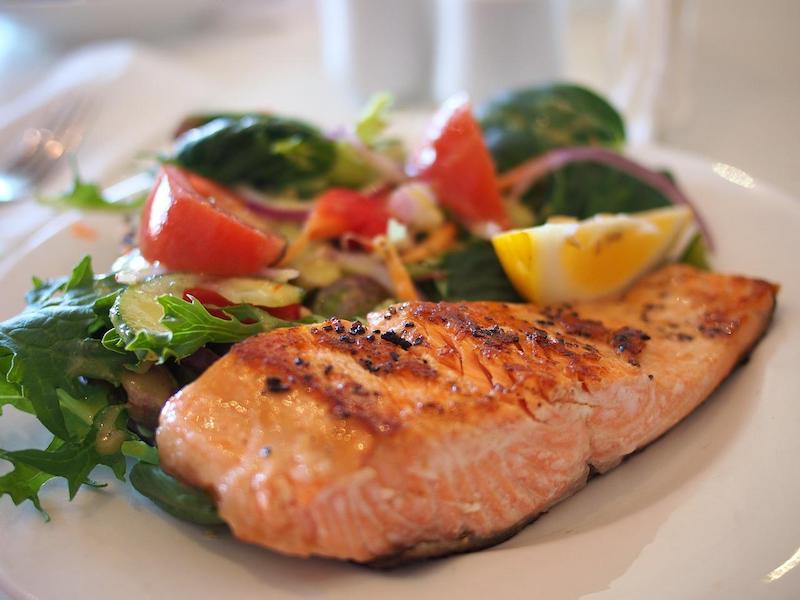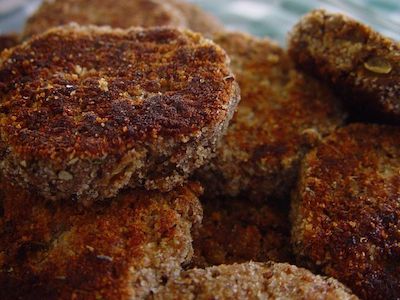Vegetarian Substitute for Fish: What Can You Eat Instead?
You don’t have to miss out on your favorite seafood dishes if you’re not eating fish. There are many ways to replicate the distinctive taste of this delicious food.
First, you can always count on vegetarian staples like tofu and mushrooms to create a convincing fish replacement.
Also, some less common ingredients like hearts of palm, jackfruit, and banana blossom can create uncanny replicas of specific fish recipes.
Keep reading to learn more about your options and find what vegetarian substitute for fish works best for you.
The fishing industry has a devastating effect on the ocean ecosystems worldwide. Excessive fishing is depleting the fish population while severely polluting the waters.
What’s worse, the fish aren’t the only animals affected by these large-scale fishing operations. Animals like sea birds, turtles, seals, and whales often fall victim to the fishing industry.
People also avoid eating fish due to health concerns. However, most foods we eat can be affected by pollutants, and fish is no different.
For example, ocean fish can be contaminated with mercury. When consumed in larger quantities, mercury can damage nerves in adults and disrupt the brain development in children.
While some people chose to stay away from fish, others had the choice made for them—namely, fish or seafood allergies are a common reason for finding a worthy fish alternative.
What Is a Good Vegetarian Substitute for Fish?
If you’re a fish-loving vegetarian, you’ll be happy to know there are many excellent choices in the vegetarian substitute for fish department.
Thanks to the rising popularity of plant-based foods, manufacturers offer a wide range of fish alternatives.
You can choose a store-bought option or pick up ingredients to make your favorite fish dish at home.
When looking for a believable fish substitute, choose ingredients that can be easily packed with flavor.
The fish flavoring is relatively easy to replicate with soy sauce, tamari, mushroom sauce, or seaweed so that the result will be just like the real deal.
This way, you’ll be able to enjoy the taste of fish without compromising your vegetarian lifestyle, health, or personal beliefs.
Thankfully, you don’t have to worry about your choices when looking for a vegetarian substitute for fish.
Whatever your favorite fish or seafood recipe is, you’ll almost certainly find an incredibly accurate replacement ingredient.
Let’s take a look at my recommended vegetarian alternatives for fish.
1. Tofu
Due to its versatility, tofu is a staple ingredient in almost all vegetarian kitchens.
The best thing about tofu is how well it absorbs spices and dish flavors. As a result, it can be transformed into various fish dishes.
In addition, tofu’s white color can somewhat emulate the fish’s appearance.
Therefore, you’ll have a highly believable vegetarian substitute for fish with the right seasoning mix and cooking technique.
One of the most popular methods of preparing tofu as fish is a dish called tofish. You can make tofish by pan-frying battered tofu fillets wrapped in nori sheets.
The result closely resembles the taste of fish, especially when served as a part of the beloved U.K. dish – fish and chips.
2. Tempeh
Tempeh is a traditional Indonesian food made from fermented soybeans.
It has a firm, nutty flavor, making it different from tofu, which is also soy-based but has a softer texture and milder taste.
Tempeh’s dense and grainy consistency allows it to absorb flavors very well, which is why it’s a favorite for marinating.
The fermentation process not only gives tempeh its unique taste and texture but also enhances its nutritional value.
It’s a great source of protein, iron, and calcium, and because it’s fermented, it contains natural probiotics that can be beneficial for gut health.
When used as a vegan fish substitute, tempeh can be sliced thinly, marinated in seaweed-based liquids for a “fishy” flavor, and then fried or baked until crispy.
3. Seitan
Seitan is a popular meat substitute made primarily from wheat gluten, the main protein of wheat.
It’s often referred to as “wheat meat” due to its meaty texture. When mixed with water and kneaded, the wheat gluten forms a sticky mass that can be shaped and seasoned to resemble various meat textures and flavors.
Seitan is versatile and can absorb flavors from marinades, making it suitable for a wide range of dishes.
Nutritionally, it’s high in protein but lacks some essential amino acids, so it’s best paired with other protein sources.
For a fish alternative, seitan can be seasoned with seaweed or kelp powder and shaped to replicate fish fillets or other seafood items.
4. Jackfruit
Jackfruit is a large tropical fruit native to South and Southeast Asia.
When young and unripe, it has a green exterior and a neutral, slightly fibrous interior that has become popular as a meat substitute in vegan and vegetarian dishes.
Its texture is reminiscent of pulled or shredded meat, which is why it’s often used in dishes like pulled “pork” sandwiches or “chicken” tacos.
Beyond its texture, jackfruit absorbs flavors and seasonings very well, allowing for a versatile range of culinary applications.
Rich in dietary fiber, vitamins, and minerals, jackfruit offers health benefits alongside its culinary uses.
When aiming for a fish substitute, jackfruit can be seasoned with marine flavors and then baked or fried to achieve a flaky consistency similar to certain fish dishes.
5. Banana Blossom
Although banana blossom is somewhat of a newcomer to vegetarian diets, it’s undoubtedly a game-changer for meat and fish substitutes.
Due to its texture and versatility, you can use it as a perfect vegetarian substitute for fish in all your favorite seafood recipes.
Banana blossoms are the fleshy flower growing on the banana plant. It has a soft and flaky texture that lends itself well to various fish dishes.
The most popular choices include battered fish, fish tacos, and seafood linguini.
6. Mushrooms
Mushrooms are an all-star ingredient in vegetarian kitchens.
They’re available in various shapes and textures, so you can use them to replicate a range of animal ingredients.
For your fish substitute needs, consider using Shiitake or King Oyster mushrooms.
These mushrooms resemble scallops, shrimp, and tuna in texture. Moreover, they have a subtle flavor that can be easily enhanced with a marinade to resemble fish sauce or shrimp paste.
7. Hearts of Palm
As the name suggests, heart of palm is a vegetable harvested from a palm tree’s core or heart.
As a result, they have a soft and stringy texture, similar to smaller seafood. For that reason, it works best as a vegetarian alternative for lobster rolls, crab cakes, and crab dips.
As always, seasoning is essential. Luckily, the heart of palm has a neutral flavor, thus perfectly pairing with sauces and more robust seasoning.
8. Nori or Other Seaweeds
Nori is a type of edible seaweed most commonly associated with sushi.
It’s dried and pressed into thin sheets which have a dark green, almost black hue.
Possessing a distinct briny flavor reminiscent of the sea, nori is often used to impart a “fishy” taste to various vegan dishes.
Additionally, it’s a rich source of minerals, vitamins, and iodine, making it not only a flavorful but also a nutritious addition to meals.
9. Eggplant
Eggplant, also known as aubergine, is a versatile vegetable with a glossy, deep purple skin and spongy, absorbent flesh.
It’s often used in various global cuisines, from Italian eggplant Parmesan to Middle Eastern baba ganoush.
When thinly sliced, marinated, and cooked, its texture and appearance can resemble certain types of fish or meat, making it a popular choice in vegan and vegetarian dishes.
Its ability to absorb flavors from sauces and marinades allows it to be a flavorful component in a wide array of recipes.
10. Artichoke Hearts
Artichoke Hearts are the tender, fleshy center of the artichoke, a thistle-like vegetable.
They have a slightly nutty and earthy flavor with a texture that is both meaty and tender, making them ideal for a variety of culinary applications.
In vegan and vegetarian cuisine, their flaky and layered structure can be leveraged as a substitute for certain types of seafood, like crab or fish.
Nutritionally, artichoke hearts are a good source of fiber, vitamins, and minerals, and they offer unique health benefits due to their antioxidant properties.
Vegetarian Substitute for Salmon
Salmon is one of the most sought-after delicacies, much loved for its versatility, nutritional benefits, and taste.
However, it has a distinctive flavor and texture, which may be challenging to replicate.
Although it might seem odd, carrots can be an excellent vegetarian substitute for salmon.
Their most popular use is in place of smoked salmon, as they check many of the boxes for a convincing alternative.
First of all, you can slice them into long, thin strips resembling the smoked salmon’s appearance.
Then, when you consider their similar colors, you can see why carrots have no problem replacing salmon on top of bagels and in sushi.
Also, when appropriately cooked and marinated in the proper seasonings with a dash of liquid smoke, carrots can successfully imitate salmon’s delicious taste.
Vegetarian Substitute for Tuna
Suppose you’re a big fan of tuna salads and sandwiches. In that case, you don’t have to give up these delicious meals once you become vegetarian.
Jackfruit has a thick rind and stringy flesh that you can eat raw or cooked. The stringy and flaky texture is what makes it a perfect tuna substitute.
Like tuna, you can buy it canned. Just make sure you purchase those canned in water and not brine.
The brine is sweet, which isn’t ideal if your final goal is to replicate tuna’s taste.
You can achieve the taste in question by cooking jackfruit in soy sauce or nori. After that, add vegan mayonnaise and enjoy your tuna meal of choice.
Why Choose a Vegetarian Substitute for Fish?
The fishing industry has a devastating effect on the ocean ecosystems worldwide. Excessive fishing is depleting the fish population while severely polluting the waters.
What’s worse, the fish aren’t the only animals affected by these large-scale fishing operations. Animals like sea birds, turtles, seals, and whales often fall victim to the fishing industry.
People also avoid eating fish due to health concerns. However, most foods we eat can be affected by pollutants, and fish is no different.
For example, ocean fish can be contaminated with mercury. When consumed in larger quantities, mercury can damage nerves in adults and disrupt the brain development in children.
While some people chose to stay away from fish, others had the choice made for them—namely, fish or seafood allergies are a common reason for finding a worthy fish alternative.
In Summary
There are many reasons to avoid eating fish, including ethical, ecological, and health concerns.
But finding a vegetarian alternative for fish can be a bit tricky. If you’re looking for a good protein source, substituting whey protein is much easier for vegetarians.
That being said, you can’t only drink smoothies for every meal. Hopefully my solutions in this article will help you find your favorite go-to vegetarian fish recipe.







